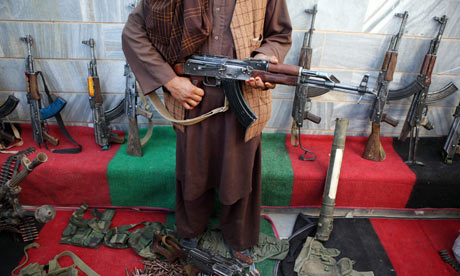Taliban fighters lay down their weapons as they surrender to the government of Herat Province in Western Afghanistan. Photograph: Majid/Getty Images Taliban fighters who lay down their arms will be offered money from an international trust fund under a plan being drawn up by British government officials, it emerged today. For months, British and US diplomats and intelligence officers have been approaching Taliban commanders considered "reconcilable". However, their approaches have been unco-ordinated and often sabotaged by mutual suspicion. In particular, the US and the Karzai government have been suspicious of British attempts to persuade Taliban fighters and other groups to abandon the insurgency. British officials are now proposing that a co-ordinated international initiative, described by some as a kind of trust fund, should be set up as a key objective of the London conference on Afghanistan on 28 January. The move reflects a growing realisation in London, Washington and throughout Nato that the conflict cannot be "won" in any military sense and that some kind of accommodation with the Taliban insurgency is inevitable. David Miliband, the foreign secretary, told MPs yesterday he hoped the London conference would agree to what he called a "reintegration programme" to help the Kabul government offer a way out of violence for Afghans who had joined the Taliban but were not committed to its ideology and could be encouraged to return to civilian life. "The insurgency is not a monolith, it comprises many different groups which have to a greater or lesser extent co-opted foreign fighters, local tribes, those who are involved in the drug trade and mercenary fighters paid as little as $10 a day," he said. "It relies heavily on the support or acquiescence of ordinary citizens, most of whom despise the Taliban but fear reprisal attacks were they to resist. "But with the right political strategy and the right balance of military muscle and political outreach we can exploit those divisions." Tackling corruption in Afghanistan will also be high on the agenda of the conference, he made clear. Miliband warned that with the Taliban installing shadow governors and courts "the Afghan authorities need to guard against not just being outgunned but also being out-governed". A recent opinion poll showed 95% of the Afghan population had experienced corruption in the police or government. Miliband said: "We hope that the London conference will help support concrete steps by the Afghan authorities to improve transparency and accountability." Senior American and British military commanders admitted yesterday that too few resources had been devoted to training the Afghan national army and police force. "Time has been lost because of lack of focus in the past," Lt Gen William Caldwell, commander of the Nato's training mission in Kabul, said, speaking by video link. He said the aim was to increase the number of Afghan forces by 58,000 by November this year. The plan is to increase the size of the ANA from the current 96,000 to 134,000 and the size of the police force from 89,000 to 109,000. However, while ANA soldiers are already taking the lead in some operations, it will be two years before the police service will be ready to take over security, Caldwell said. A pay structure is being set up with police and army recruits getting $165 a month, described by Caldwell as enough to sustain a living for a "small family", rising to $245 a month. Financial incentives are being introduced to encourage soldiers and police offers to stay on, and they would get extra rewards for being deployed in particularly hostile areas. The new recruitment drive – including Pashtuns from southern Afghanistan, who are under-represented in the ANA – coincides with the deployment of thousands of US troops to Helmand province, where British forces have been based for the past four years. US troops will take over from the British in Musa Qala and the Sangin Valley – two places where scores of British troops have been killed, the latest on Monday when Captain Daniel Read, a specialist in defusing bombs, was killed by an explosion in Musa Qala. It was "nonsensical" to maintain a situation where British troops were responsible for looking after 60% of the population of Helmand with just 30% of the total force level there, a senior British army spokesman said yesterday. In the Commons, Miliband said it was "nonsense" to describe British forces as retreating or ceding ground to the US. 9,500 British troops are based in Helmand. There are also 32 serving or former British police officers training Afghan recruits there, British officials said.
Saturday, 16 January 2010
Posted by
Britannia Radio
at
10:54
![]()





















